
English_books / New Cambridge Advanced
.pdf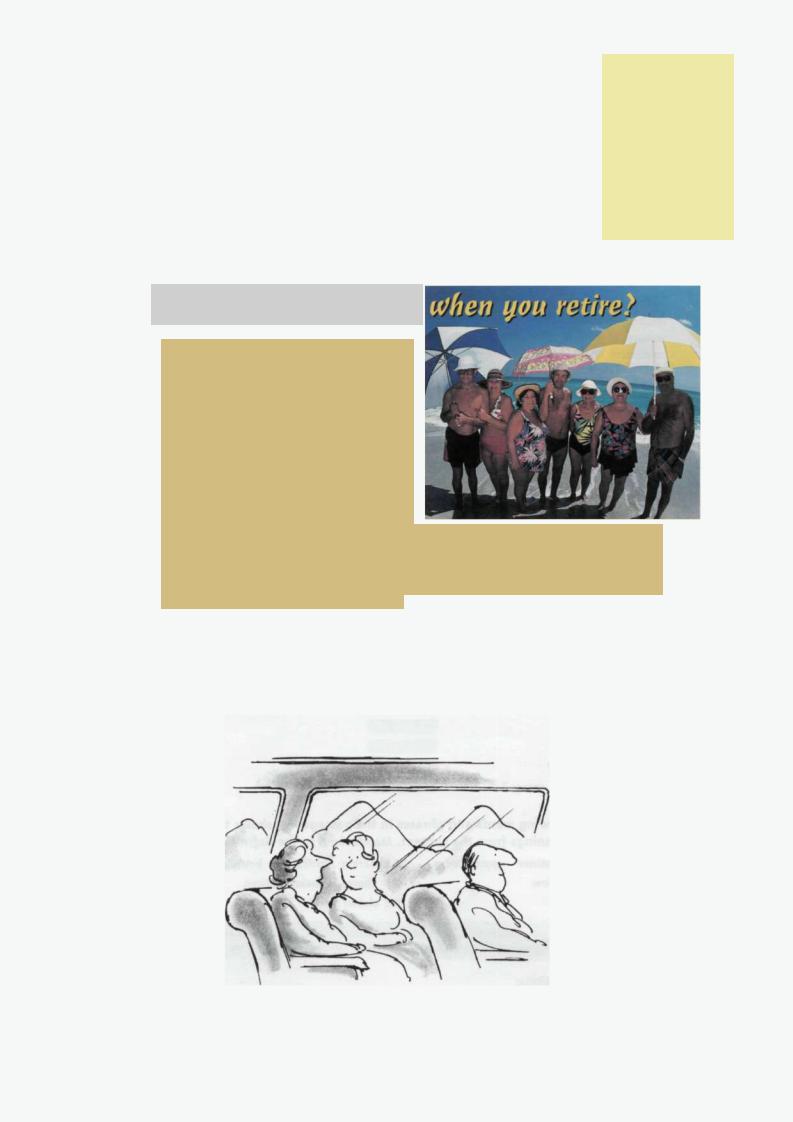
A letter to the editor
Creative writing
This is the first part of an article that appeared in a magazine which is mainly read by 18to 25-year-olds. After you've read it, discuss these questions:
•What are your reactions to the article?
•How relevant is it to the readers of the magazine?
•What kind of people and what age groups would be interested in this kind of article?
The reader of a letter to the editor isn't actually the editor, but the readers of the publication. Try to interest typical readers and make it easy for them to follow, in the hope that they'll agree with
your views.
What will you live on
Plan поw to enjoy your retirement...
Properly planned, retirement should give you some of the best years of your life - with money to spend and the leisure to enjoy it. A personal pension plan will give you just that
With your own personal pension plan you can retire with a pension for life, a substantial capital sum, and the opportunity to turn your dreams into reality!
It's your future. The sooner you start, the greater your pension. The later you
leave it, the more you will have to pay for a similar benefit. It's never too early to start a personal pension plan and even small payments will grow over the years to give you a wonderful life when you retire.
1Write a letter for the Letters page of the magazine (about 250 words). Explain your reactions to the article and your opinion about it being published in your favourite magazine.
2Show your completed letter to a partner. Ask for feedback on your use of paragraphs, as well as on the ideas.
'There comes a day when you suddenly realise you
don't mind being herded on a bus'.'
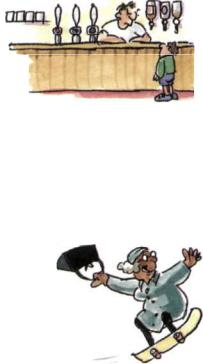
New Cambridge Advanced English
Ages
Idioms and collocations
Fill the gaps in these sentences using the phrases below.
1 |
If you are |
|
you're not allowed to buy drinks in a pub |
|||
2 |
Columbus sailed from the |
to the |
|
|
||
3 |
In an attempt to bring |
into the firm, they're only taking |
||||
|
on people under 25. |
|
|
|
|
|
4 |
She used go out with Terry - he's an |
of hers but she hasn't |
||||
|
seen him |
|
. |
|
|
|
5 |
If you're a |
to the firm and you don't know the ropes, you |
||||
|
can ask one of the |
for advice. |
|
|
||
6 |
We are |
|
and whenever we meet we reminisce about |
|||
7 |
The Great Lakes in America are |
not saltwater lakes. |
||||
8 |
He didn't enjoy his work, so he decided to make a |
by |
||||
|
applying for a new job. |
|
|
|
||
9 |
I prefer paintings by the |
to modern paintings. |
||||
10 |
People in Britain |
at 18, when they are officially 'adults'. |
||||
11 |
You can't catch a cold from getting wet - that's an |
. |
||||
|
However, plenty of |
can keep you healthy. |
|
|||
12 |
Grandad's ideas are terribly out of date - he still seems to think he's living |
|||||
|
in the |
|
not the |
. My grandma, I'm happy |
||
|
to say, is still |
and she always says 'You're only |
||||
|
come of age for ages space age |
Stone Age |
under age |
|||
|
fresh air |
fresh start |
freshwater |
new blood |
New World |
newcomer |
|
old flame |
old friend |
old hand |
old master |
old times |
old wives' tale Old World |
as old as you feel young at heart
Fill each gap with one word that collocates with the word before or after it:
THE TOMB OF THE UNKNOWN FRIEND
saw somebody on the street yesterday that I almost knew very well. It was |
||||
Ia man with a kind and interesting , |
. Too bad we had never met |
|||
2 |
. We might have been very close 3 |
if only we had met. |
||
When I saw him I almost 4 |
like stopping and suggesting that we |
|||
have |
a drink and talk about |
5 |
times, mutual friends |
and |
6 |
: Whatever happened to so and so? and do you 7 |
the |
||
night when we . . . ?
The only thing missing was that we had shared no old 8
together to talk about because you have to meet somebody before you can do that.
The man walked by me without any recognizing 9 |
. My face |
|||
wore the same mask, but 10 |
I felt as if I almost knew him. It was |
|||
really a |
11 |
that the only thing that separated us from being good |
||
friends was the stupid fact that we had never met. |
|
|||
We both disappeared in 12 |
directions that |
swallowed any |
||
possibility |
of friendship. |
|
|
|
from The Tokyo-Montana Express by Richard Brautigan

An ideal home?
Vocabulary and Listening
 1 Look at the photos and discuss what it would be like to live in each of the places shown.
1 Look at the photos and discuss what it would be like to live in each of the places shown.
Write down ten words that come into your mind when you think about apartments, houses, towns and cities.
Find out where each of your partners lives. First ask them to describe their bedroom . . .
then the rooms adjoining it . . . then the building . . . then the street. . . and finally the district they live in.
During your discussion WRITE DOWN any useful new words you come across and note down any questions about vocabulary that you want to ask your teacher later. If you have any difficulties with vocabulary, ask your partners or consult a dictionary.
You'll hear six people talking about their present homes (in Britain) and where they'd like to live. Match the name of the speakers to the points they make.
Catherine |
American houses have screen doors to keep the flies out. |
Melinda |
American houses take up more land than British houses. |
Blain |
My home isn't in the country, but it seems like it. |
Kate |
My house is very isolated. |
Richard |
My ideal home would be an old house in the country. |
Karen |
My ideal home would have a large living room, with a bed. |
2Find out how your partners reacted to what each speaker said and the ideas they expressed. Then find out:
•why your partners like their present home
•what the differences are between homes in their country and Britain
*what their ideal living room would contain
*about the advantages and drawbacks of living alone
New Cambridge Advanced English
The perfect society?
Reading and Listening
1Read this article and MAKE NOTES on what you think are the most desirable and least desirable features of Aldous Huxley's Pala (GOOD and BAD POINTS).
2Compare your notes. Do you agree which features are good and bad? Which is the best feature? Which is the worst feature?
Island...
the book that spelled out the ingredients for Utopia
LONG BEFORE JOGGING in Central Park became the fashion, intellectuals on the tropical island of Pala used to put in a couple of hours hard digging every day. They weren't obliged to. But the Palanese were very advanced in matters of health: they didn't separate minds from bodies, venerating brains at the expense of the whole human organism.
In economic matters too, Palanese thinking was very advanced. Export crops were discouraged: the islanders were fed first. Money was wasted neither on status symbols nor on weapons. The government bought no armaments: there was no army.
Where was this Utopia? Only unfortunately, between the covers of Island, Aldous Huxley's final novel. In it he detailed his prescription for a sane society — especially for Third World countries short on money but rich in human resources.
Huxley showed how colonialism had carved out a false channel for most developing countries, draining them of their.wealth and their culture. He advocated a siege economy, to stop the leakage. Pala was closed to the outside world, especially out of bounds to merchants, missionaries and media-men, the usual links between the developing world and the West.
Within the walls of the island fortress, radical changes were brought about. For example, wealth was shared more equally
— the richest Palanese earning not more than four or five times as much as the poorest. And jobs didn't define personal worth, since the Palanese swapped jobs regularly. Being a doctor for six months and then a farmer for the rest of the year not only made a Palanese a more rounded person, but also made sure he didn't consider himself superior to people who got their hands dirty The personal and social integration achieved were, for the Palanese, worth more than the time and money spent on making the changeover.
Huxley takes, one at a time, every important social ingredient that he can squeeze into a 300 page novel — schools, newspapers, politicians, religious and scientific beliefs, ideas about family life — and examines it to find its
value. What, for example, is there worth saving in family life? And what is constraining about it? Huxley doesn't polarise the issue into pro-family or anti-family camps. He concocts his own variation of a family that accommodates both the closeness and security that come from a two-parent set-up as well as the variety and freedom that come from a child having several homes to choose from. Palanese society, therefore, is an amalgam of the best in every society that Huxley knows.
First published in 1962, Island had a powerful influence on the young idealists of the day. Many of the ideas were so advanced that they are only now being widely recognised— like Huxley's insistence that Western medicine and holistic health care techniques should be allies, not enemies.
But there is one huge snag. Pala is fiction. Huxley is the God of Pala. How are real people in real countries to shift to this paradisal willingness to live cooperatively? For instance, it might not help a real country to adopt a siege economy: who would stop the big bad unequal world outside the fortress walls from being reproduced within the walls as a small bad unequal world?
Huxley's answer leads him out of the political realm into the realm of spiritual values. His islanders have evolved inwardly. They have all experienced a transpersonal dimension where they are part of a universal oneness; when they return to the material world, they remain inspired by the glimpse of the ideal.
Dangerous waters. Perhaps to forestall critics tempted to dismiss Huxley as a dreamy 1960 mysticism-junkie, he included among his cast of characters a group of spiritual fakes, charismatic guru figures who use their followers' gullibility to gain political power and line their pockets. Huxley sets these vigorously apart from the genuinely spiritual, whose spirituality is infused matter-of-factly into their everyday lives, in everything they do — eating dinner, making love, coping with an injury. It is their constant awareness of the here and now — a phrase popularised more by Island, surely, than by any other book—that does the trick.
In Huxley's Brave New World, everything from muzak to mechanical sex was used to blot out consciousness and turn people into manipulable zombies. The result was a hell on earth. In Island, everything, including sex and drugs, is partaken of consciously to heighten individual consciousness still further. The result is Pala, Huxley's heaven on earth.
Anuradha Vittachi
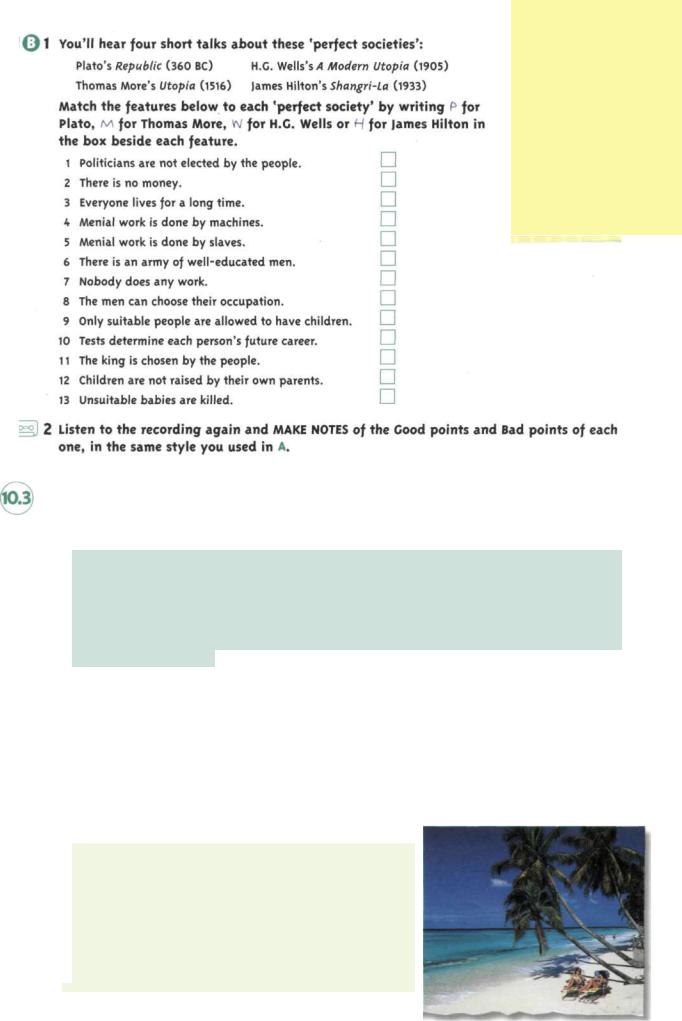
When you attend a lecture, seminar, meeting or workshop you may need to make notes. This usually has to be done at the time, not afterwards, in case you forget the important points. You may also need to make notes if you want to remember information that you read in a borrowed book or report. But if it's your own copy, you could use a highlighter instead.
The best of all possible worlds
Reading and Speaking
Dear Friend,
Most of us have dreamed at one time or another of finding a place where we can be truly happy ... a Shangri-La with an ideal climate, remote from turmoil and confusion; where the air is fresh and free from pollution and the only noise we hear is that of the wind in the trees, the roar of the sea and the song of the birds
— but still dose enough to civilization to enjoy the benefits of a thriving, metropolitan city.
tYou'll hear the rest of the above letter being read aloud. Make notes on the main points and compare your notes with a partner.
2Now read the leaflet on the next page and highlight what you consider to be the most interesting points.
3Decide together what would be the main advantages and drawbacks of life in Nosara. What were the two most interesting points you highlighted?
"Costa Rica, sometimes called the Switzerland of
Latin America, has been unscathed by the turmoil that typifies the rest of Central America. Its army was disbanded by constitutional decree in 1948, and most of the national budget goes into education and health care . . . There are four universities, and the nation boasts it has mom schoolhouses than policemen. The literacy rate is above 90%, among the highest in the. world, while the infant mortality rate is among
the lowest. . . * The Los Angeles Times

New Cambridge Advanced English
Beach homesites for sale in beautiful
Costa Rica...
Now you can own property along the beaches of Nosara in peaceful
Costa Rica for just $6,450 - only $150 down-payment, and $150 a month
at absolutely no risk!
Imagine a home tucked away in a secluded cove or on a lush green hillside within a 10 minute walk of a broad, white sand beach caressed by gentle ocean breezes . . . a nearby river . . . year round temperature that seldom goes below 72 degrees or above 82 degrees . . . plenty of room for horses, a few cattle, ample gardens, and located in a country with one of the most stable democratic governments in the world, where the military establishment has been banned by constitutional decree, the literacy rate and health care systems are among the best in the world, and where foreigners are genuinely liked and appreciated and afforded all the legal protections of citizens.
Dreams don't come true by themselves. There comes a time to take action, and if you want to someday live in paradise, that time is now.
We have more than 3,000 acres subdivided into homesites and farms that range in size from 3 to more than 12 acres, with 25 miles of allyear roads, electricity and water systems already in operation, and an ecologically sound master plan that provides for parks and green areas.
Full title to the 3 acre homesites — all within a 10 minute walk of the beach — is being offered for only $150 down-payment and 42 payments of $150 a month, with NO INTEREST CHARGE! But we don't want anyone to risk buying something they're not completely sure of, so we also provide
a unique guarantee: If you visit Nosara at any time within one year of signing the purchase agreement and decide for any reason that you don't want the property, WE WILL REFUND EVERY CENT YOU HAVE PAID, with no questions asked! Or if you find another site you would prefer to own, we will be pleased to work a trade and apply the money already paid toward the new site.
Nosara is on the beautiful Pacific West Coast just 100 miles from San Jose the capital city. There are already 65 homes built at the beaches of Nosara, and they range from comfortable $8,000 cabins to expansive villas of around $100,000 (construction cost averages only $25 per square foot). Hundreds of acres have been set aside for parks and wildlife refuges that abound with wild parrots and other birds, deer, pecary and other animal life. The beaches are without equal any place in the world, but remain tranquil and uncrowded.
Yes, you can find all the privacy you have ever dreamed of in Nosara, but there's no need to give up the amenities of the "good life". There are two luxurious hotels with a swimming pool and fine restaurants, tennis courts, horseback riding, some of the finest sportfishing in the world for marlin, sailfish, dolphin, wahoo, tuna, snapper and much more! If you crave the nightlife and shopping of a cosmopolitan city, drive to San Jose or fly by air service from the Nosara airport.
There's only so much time for dreaming...
SOL DE NOSARA
PO Box 1084 Centro Colon
San Jose 1007
Costa Rica
Reread The Castaways on page 12.
Work as a team to design your own Utopia. Decide on these aspects:
• |
the physical environment |
• |
food and drink |
• |
government |
• |
work and employment |
• |
possessions and wealth |
• |
science and technology |
• |
public and private transport |
• |
family structures |
• |
education system |
• |
law and order |
Write a description of your own idea of Utopia as an article for a student magazine (about 250 words).
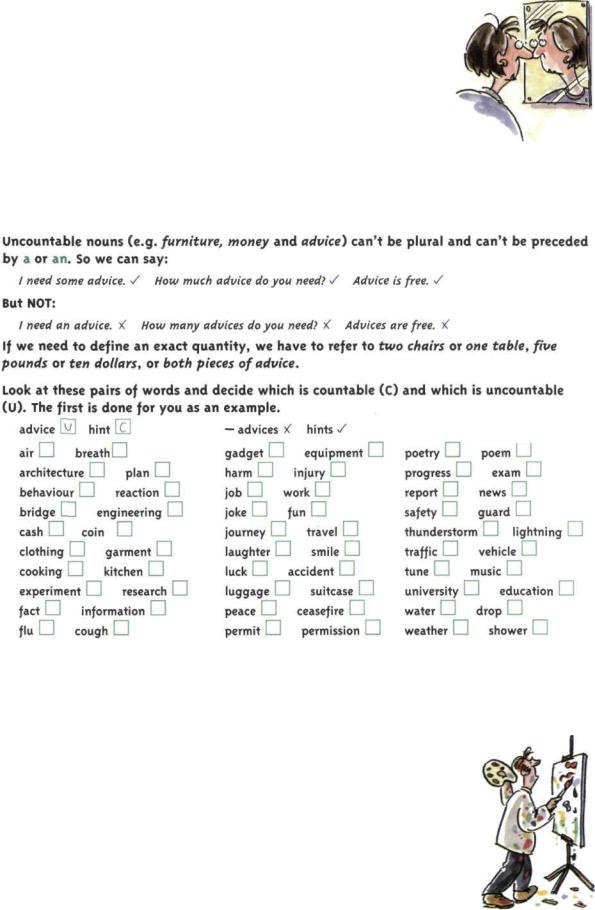
Articles
Grammar
Discuss the difference in meaning between these sentences:
She has some grey hairs.
She has grey hair.
There's a hair in my soup!
There's the hair - in my soup!
Ask a teacher if you have a question. Ask any teacher if you have a question. Ask the teacher if you have a question.
After leaving school he went to sea.
I'm going to buy a paper.
I'm going to buy the paper.
She has some grey hair.
She has a grey hair.
There's hair in my soup!
There's some hair in my soup!
After leaving the school he went to the sea.
I'm going to buy some paper.
I'm going to buy paper.
Some nouns may be either countable (C) or uncountable (u), depending on their meaning. Look at these examples and then write down your own examples for the nouns in the list below.
U Our house is built of stone.
C There's a stone in my shoe. How many stones were thrown?
UShe's away on business. Business is improving. C The number of small businesses is increasing.
U How much fruit was sold?
C An orange is a citrus fruit. My favourite fruits are oranges and mangoes.
UPainting is not as easy as it looks.
C What a beautiful painting! I enjoy looking at paintings.
bone |
brick |
cake |
cloth |
crime |
fish glass language life |
light |
metal |
noise |
pain |
paper |
plastic pleasure religion |
sound |
space |
wood |
|
|
|
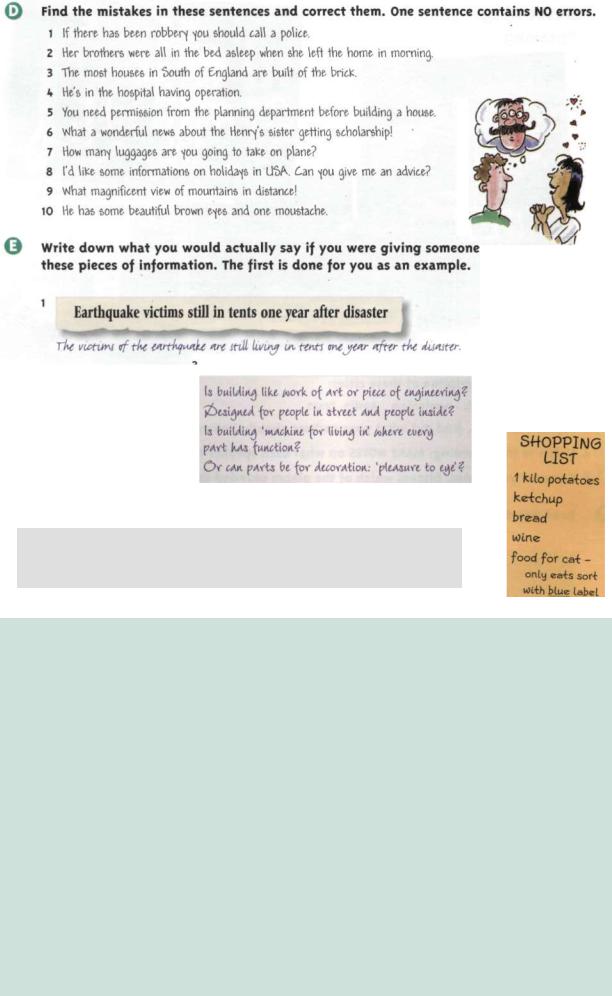
New Cambridge Advanced English
IMPORTANT
Make sure computer is disconnected from mains before lifting cover. To replace battery: use screwdriver to loosen screws A and В and lift cover. Remove old battery from socket Z and replace with fresh battery.
PLEASE SEND INSTRUCTION MANUAL FOR MACHINE NE
ORDERED AT THE END OF THE MONTH. PRODUCTION MANAGER
ALSO REQUIRES COPY OF SPECIFICATION SHEET.
F Fill the gaps in this passage with this, their, a, the, or 0 (i.e. no article).
60% of families in |
UK own |
own homes after borrowing money (known as |
|||||||
mortgage) from |
building society or bank. They have to make |
monthly repayments of |
|||||||
total sum (plus interest) for 20-25 years. People can usually borrow |
sum equivalent |
||||||||
to three times |
annual salary, but need to put down |
cash deposit of 10% of |
|||||||
purchase price. |
people in Britain tend to move |
house several times in |
lives. |
||||||
typical pattern is for |
|
young couple to start as 'first-time buyers' in |
small flat |
||||||
or house, then move to |
larger house when they have |
family and, when |
|||||||
children have left |
home, to move into |
smaller house or bungalow. Usually they move |
|||||||
into |
other people's houses or into |
|
new home that has been built on |
new |
|||||
estate by |
builder. Families in |
|
lower income groups are more likely to live in |
||||||
rented accommodation, for example in |
|
council house or flat. |
|
|
|||||
Moving home can be |
stressful experience, only slightly less traumatic than |
||||||||
bereavement or divorce. Often |
|
buyer and seller of |
house are part of |
'chain', |
|||||
where |
sale of one house depends on |
|
whole series of strangers doing |
same |
|||||
thing at |
same time. If one deal falls through at |
last moment, |
whole chain |
||||||
breaks down and no one is able to move.

You'll hear a description of these cities:
Rome New York Amsterdam Austin, Texas
1Before you listen, find out what your partner already knows about each city.
2Listen to the recording. MAKE NOTES on what each speaker likes about each place.
3Compare your notes. Discuss which of the places sounded most attractive to you, and why. Read this description of another city and fill each gap with one suitable ADJECTIVE:
BRASILIA - UTOPIA IN THE HEART OF BRAZIL
Brasilia, the capital city of Brazil, was designed as a , |
Utopian city in the 1950s by Lucio |
Costa and Oscar Niemeyer, both followers of the 2 |
French architect Le Corbusier. Brasilia is |
a purpose-built city twelve hundred kilometres from the coast on a red-dirt plateau where no one lived
— or wanted to live. It's the most photogenic city in the world with 3 |
avenues, |
||
j, |
ceremonial buildings and 5 |
sunsets. |
|
|
The parliament building, shops, hotels, flats, 6 |
suburbs for the middle classes, |
|
schools, the university and the ministries are all located in separate zones. But looking more closely
at the 7 |
buildings you can see that they are falling to bits because they were built on |
||
the cheap. In a city where temperatures are normally over 30 degrees, the |
indoor |
||
shopping centre is not even air-conditioned. And the poorer workers and their families are |
|
||
accommodated in <, |
shanty towns on the edge of the city. |
|
|
It's a city designed for the automobile with 10 |
multi-lane highways but no |
||
pavements or pedestrian crossings because, in the future, everyone would have a car. Unfortunately, even today only one in eight of the citizens of Brasilia has access to a car and the public transport
system is л |
. Most of the time the highways are ,2 |
but twice a day they are |
jammed with cars and pedestrians have to dodge the traffic to get across. |
|
|
The one consolation for the very rich is that there are 13 |
flights to Rio. It's scarcely |
|
surprising that on Friday afternoons all the flights out are fully booked. This Utopia is a place people want to escape from.

New Cambridge Advanced English
1 Discuss how you would answer these questions about YOUR OWN CITY, TOWN or VILLAGE (or the district you live in if you live in a very large city).
Try to imagine what it might seem like to a stranger. If you're very familiar with a place it's hard not to assume that 'it's obvious what it's like' — so you may have to try to distance yourself.
First impressions |
|
Imagine you're returning there after being away — as you arrive there, what |
|
|
strikes you about the place? What kind of atmosphere is there? What is special |
|
|
about the place? |
Basic facts |
|
How big is it and where is it? (population of metropolitan area, distance from |
|
|
other cities, distance from coast, etc.) |
Districts |
|
What are the different areas and what are they like? (old town, commercial |
|
|
areas, industrial zones, shopping centre, residential districts, suburbs, slums |
|
|
and shanty towns, etc.) |
Buildings |
|
What is the style of the architecture? Where do people live? (public and |
|
|
commercial buildings, blocks of flats, etc.) |
Open spaces |
|
Where do people gather together out of doors? (squares, parks, open-air |
|
|
cafes, etc.) When is the weather suitable for this? |
Roads and streets |
|
What kinds of roads are characteristic of the place? (main thoroughfares, |
|
|
back streets, avenues, boulevards, alleyways, etc.) |
Transport |
|
How do people get about within the city and how do they travel in and out? |
|
|
(amount of traffic, public transport, commuter travel, rail connections, |
|
|
airport, etc.) |
Entertainment |
|
What do people do in their leisure time? (sports, cinemas, theatre, music, |
|
|
museums and galleries, nightclubs, restaurants, bars and cafes, etc.) |
Employment |
|
How do people earn their living? (manufacturing, commerce, public sector, |
|
|
etc.) What is the unemployment situation? |
Education |
|
What facilities are there for secondary and tertiary education? (schools, |
|
|
colleges, university, evening classes, etc.) |
Visitors |
|
What are the sights that tourists visit? What might a newcomer from abroad |
|
|
find strange or difficult about living there? |
YOU |
|
How do you fit into all this? What do you like about the place? What do |
|
|
you dislike about it? |
2Find someone from another group who does NOT know the place you've been discussing as well as you do. Find out about each other's town, city, village or district.
Imagine that you've received this fax from a group of students at a high school in Austin, Texas. Write a letter in reply (about 250 words).
Our teacher has offered to arrange a two-week study visit for our class to your country - and your city is on our list of
possible places to go to. We have read a brochure about the city and it sounds nice, but what is it really, like? What do you think we would enjoy there? Why would it be a good place for us to stay, bearing in mind that we are all t8-i9 years old ana none of us have traveled overseas before?
When you have a lot to say, and it all seems relevant, it's hard to decide what to omit. Thinking about your readers and what might interest them (rather than what interests you) can help you
to decide what to write.
